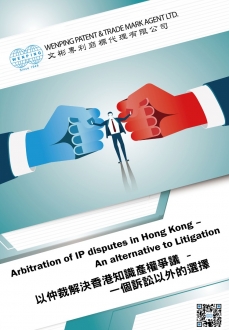Hong Kong is an arbitration-friendly city, while the government of the city keeps boosting its intellectual property system, paving the way to become an IP trading hub in Asia. In that context, the Arbitration (Amendment) Ordinance has come into effect on 1 January 2018, after it was passed by the Legislative Council on 14 June 2017. The Amendment clarifies that all disputes relating to Intellectual property rights (IPRs) can be arbitrated, whether or not the IPRs are registered, or subsist in Hong Kong.
According to the statistics of Hong Kong International Arbitration Centre (HKIAC) in 2017, there were more than five hundred cases of arbitration, 70% of which involved international arbitration. However, before introduction of the Amendment Ordinance, in Hong Kong, it was uncertain whether IP disputes can resort to arbitration as there was previously no corresponding explicit provision in the original Arbitration Ordinance. At that juncture, litigation was a common means for the contending parties to resolve their IPR disputes. Resolution via judicial proceedings implies that there will be relatively less autonomy given to the parties regarding the course and outcome of proceedings. In addition, litigation may disclose confidential information of these parties to the public, which can be detrimental to their businesses. Besides, for IP disputes involving more than one jurisdiction, which are quite common in reality, the court decisions of these jurisdictions can be different or even contradicting one another. Owing to the above, resolution of IP disputes can be a pickle for the parties involved.
According to the Amendment, the scope of arbitration covers all types of IPRs including patents, trademarks, designs, trade secrets, copyrights and etc. Arbitrable IPR disputes can be disputes regarding enforceability, infringement, subsistence, validity, ownership, scope, duration or any other aspect, as well as transaction or compensation payable of IPRs. It also states that it is not contrary to the public policy of Hong Kong to enforce an arbitral award regarding IPRs disputes. An arbitral award is final and binding on the disputing parties and is generally not binding to third parties.
There are a couple of advantages of resolving IPR disputes using arbitration:
Higher degree of autonomy – The parties can negotiate to choose arbitrator(s), applicable law, scope and procedure of arbitration.
Avoid judicial proceedings in multiple jurisdictions – The parties can resolve the disputes in a single arbitration instead of multiple litigations which may give conflicting results.
Shorter length of time and lower cost – Expensive and time consuming judicial proceedings can be dispensed with.
Higher confidentiality – The procedures of arbitration and arbitral award are confidential so that there will be minimal negative impact on the reputation of the parties.
Professional and neutral arbitral tribunal – The parties can choose one or more arbitrators with appropriate expertise and with higher tendency to be neutral to the parties.
In accordance with the parties' free will and autonomy, after the parties agree to come to arbitration for their disputes, the procedures of arbitration can be decided by the parties, regarding scope of arbitration, constitution of arbitration tribunal, date and venue of hearing, exchange of evidence and any other details. The parties can appoint an arbitration tribunal which consists of one or more experts in legal or other professional fields as arbitrators. At the end of the arbitration, the arbitration tribunal can award the same remedy or relief that can be ordered by the courts in Hong Kong, unless the parties agree to limit the remedy or relief. As Hong Kong is considered generally as a pro-arbitration jurisdiction, an arbitral award, which is either made in Hong Kong or other jurisdictions, is enforceable in the city. The award can only be set aside under several circumstances, for instance, when the award is contrary to the public policy, the dispute is considered unarbitrable according to the laws of Hong Kong, the arbitration agreement is invalid or the procedures conducted are not consistent with agreement. Since Hong Kong is a party to the New York Convention, Hong Kong arbitral awards can be recognized and enforced in other signatory countries or jurisdictions. Besides, arbitral awards can be enforceable between Hong Kong and Mainland China based on the Arrangement Concerning Mutual Enforcement of Arbitral Awards.
For any agreement regarding IPRs, the parties can consider arbitration in the case of disputes. The parties shall pay attention when they are drafting the arbitration clause as a part of the agreement, to make sure they have considered some details of arbitration and the relevant scope of application, such as language, procedures, law to be applied and etc. A separate arbitration agreement can be reached before or after the occurrence of disputes. In any case, arbitration can be an option to resolve disputes, especially if the parties are willing to sit down and negotiate in good faith.


